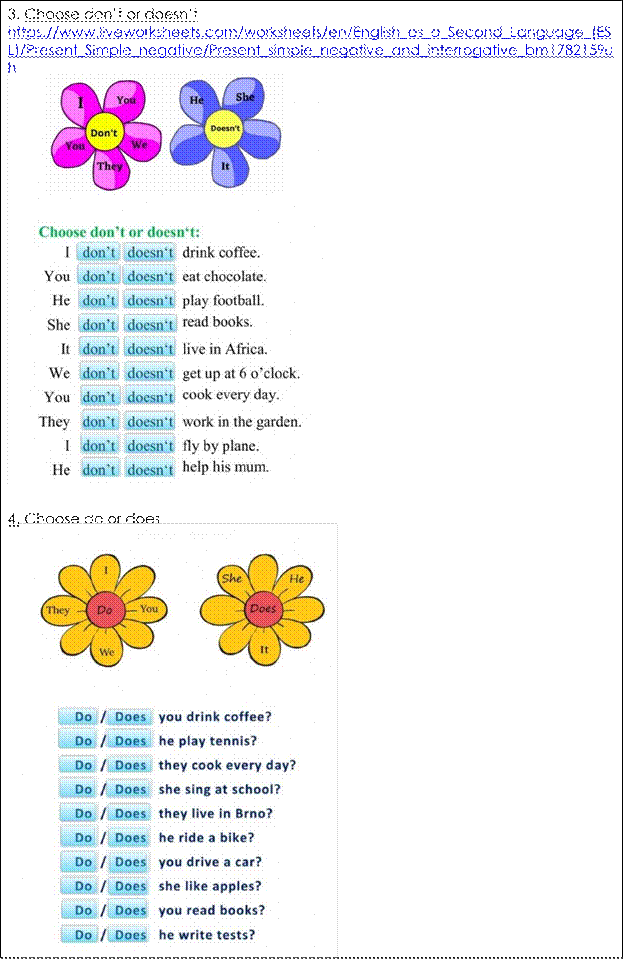
|
Студенты |
3 класс, обучение по программе Rainbow English |
|
Материалы |
Rainbow English 3, wordwall.net, liveworksheets.com, свои материалы. |
|
Цели |
● выявить пробелы в понимании правила употребления глаголов “to be” и “to do” в Present Simple в повествовательных, отрицательных и вопросительных предложениях; ● научить употреблять глаголы “to be” и “to do” в нужных формах в зависимости от контекста. |
|
Warm-up 1. Simon says: revision of the active action words. 2. Flashcards: revision of the personal and possessive pronouns (4 flashcards, describe all of them (e.g. His name is Ben, he is ten). Remove one card – the student should continue describing as if all the flashcards were on their places. Go on to remove the cards.) or Say it in another way (a ball game): I am Kate – My name is Kate; You are Kate – Your name is Kate. |
|
|
Test (Тестирование остаточных знаний) |
|
|
1. Read the text. Choose the correct form of the verb “to be” or “to do”. My name (am, is, are) Helen. I (am, is, are) 10. I (read, reads) books and (dance, dances) very well. I (have, has) a nice family. I (don’t, doesn’t) have a sister. I (have, has) a big brother. His name (am, is, are) Andrew. He (isn’t, aren’t) 10. He (am, is, are) 15. He (don’t, doesn’t) sing. He (play, plays) computer games. My mother (isn’t, aren’t) a doctor. She (am, is, are) a nurse. Her name (am, is, are) Sue. She (don’t, doesn’t) swim. She (read, reads) Russian and English books. My father (isn’t, aren’t) a teacher. He (am, is, are) a cook. His name (am, is, are) Ted. He (cook, cooks) very well. He (don’t, doesn’t) ride a bike. He (play, plays) pingpong and football well. We (have, has) two pets. They (isn’t, aren’t) dogs. They (am, is, are) cats. We (like, likes) our pets. We (am, is, are) a happy family.
2. Answer the question to the text: 1. Is Helen 10? – Yes, she is/ No, she isn’t. 2. Does Helen have a brother? - Yes, she does/ No, she doesn’t. 3. Does Andrew sing? – Yes, he does / No, he doesn’t. 4. Is Sue a cook? – Yes, she is/ No she isn’t. 5. Does Sue swim? – Yes, she does/ No, she doesn’t. 6. Is Ted a teacher? – Yes, he is / No, he isn’t. 7. Does Ted cook very well? – Yes, he does / No, he doesn’t. 8. Do they have pets? – Yes, they do / No, they don’t. 9. Are the pets dogs? – Yes, they are / No they aren’t.
|
|
|
Teach (Presentation + Guided Practice) (Объяснение темы на основе ошибок из тестирования+практика) |
|
1. Read the story again and find examples of: ● the verb “to be” in the Present Simple; ● the verb “to do” in the Present Simple; ● other verbs in the Present Simple.
2. Choose the correct variant and find examples in the text above. In negative and interrogative sentences in the Present Simple we use: ● the verb “to be (am, is, are)” if there isn’t any other verb (or action verb) in the sentence. (My father isn’t a teacher); ● the verb “to do (does)” if there is another verb (or action verb) in the sentence. (He doesn’t ride a bike). (Если остаются вопросы, или формулировка непонятна, объяснение дается на родном языке: - Проверить, какой глагол нужно употреблять можно таким образом: задайте вопрос к смысловому глаголу: «I feed my dog» - to feed – что делать? - I feed – я что делаю? Слышим глагол «делать», значит, в отрицательных и вопросительных предложениях используем do/does.)
2. Match two parts of the
sentence. Mind the forms of the auxiliary verb “to do” |

|
5. Choose the correct form of the verb “to be” https://test-english.com/grammar-points/a1/present-simple-forms-of-to-be/
6.
7. Choose am not, isn’t, aren’t, don’t or doesn’t 1. His name ___ Jack. 2. We ___ teach students. 3. The horses ___ black on the farm. 4. These lorries ___ big. 5. I ___ like roses and tulips. 6. She ___ see vans, cars, buses or taxis in the street. 7. Those beds ___ in the bedroom. 8. This dog ___ like to play and run in the park. 9. I ___ a schoolgirl.
|
|||||||||
|
Test (Повторное тестирование) |
|||||||||
|
1. Read the text and choose the correct form of the verb “to be” or “to do”:
I live with my sister Polly, mum Jenny, and dad Max. My sister __ big, she is little. We ___ live in Moscow, we live in London. My dad ___ from London, he is from Paris. But he speaks English very well. My dad ___ a doctor, he is a teacher. He ___ teach students, he teaches pupils. My mum ___ from London, too. She is from Moscow. My mum ___ work. She likes to play the piano and to read books. But she ___ like to sing and dance. |
|||||||||
|
Where ___ my sister from? She ___ from Paris, she is from London. What ___ my sister like to do? She likes to play computer games. What pets ___ we have? We have a dog. What colour ___ the dog? It is black and white. What house ___ we have? We have a big house. Where ___ our house? It is by the lake.
2. Play “Grammar-Meets-Conversation” game: a) Complete the questions with the correct form of “to be” or “to do”. b) “Interview” your toy (you can use a flashcard or an imaginary person) using these questions. c) Tell the teacher some things about the person/toy you’ve interviewed.
3. Further practice: interview your family members or friends using your own questions and the questions above. Next time tell your teacher about these people.
|
Материалы на данной страницы взяты из открытых источников либо размещены пользователем в соответствии с договором-офертой сайта. Вы можете сообщить о нарушении.